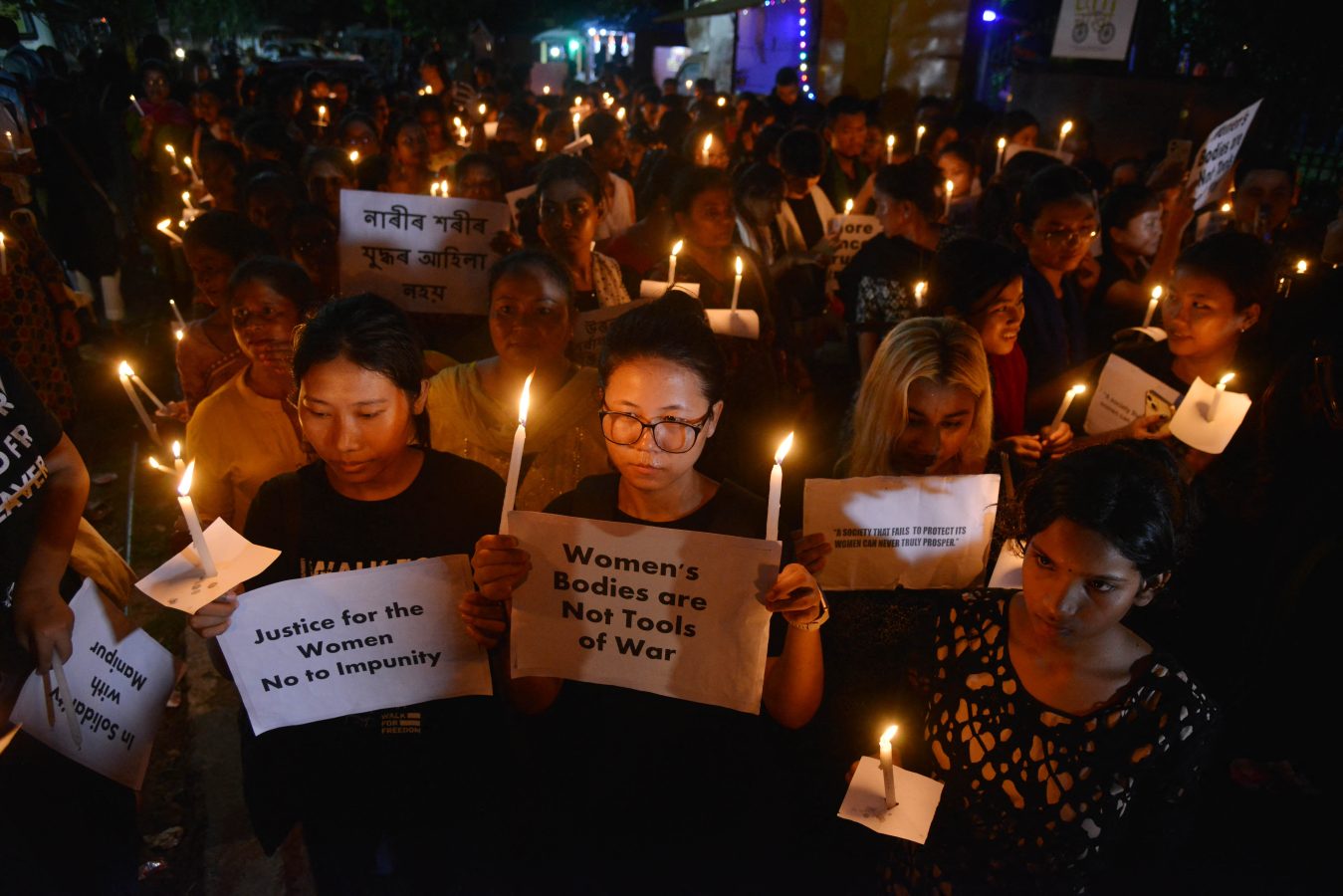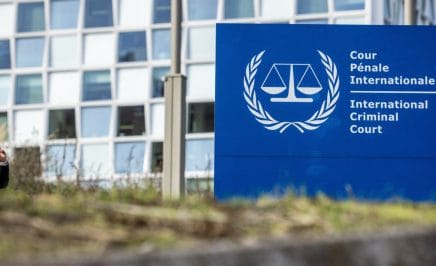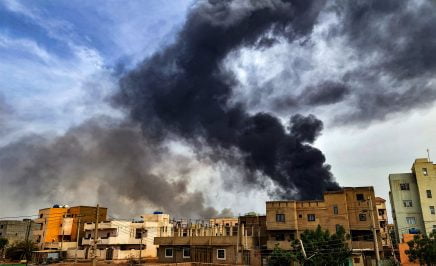- Impunity of vigilante groups
- Police failing victims of communal violence
- Journalists, activists, influencers silenced through attacks and trumped-up charges
- Relief camps in dire need of support
More than four hundred days since the start of ethnic violence between the dominant Meitei community and the minority Kuki and other tribal hill communities, the Bharatiya Janata Party (BJP)-led Indian government and Manipur state government have utterly failed to end the violence and displacement and protect human rights in the state, said Amnesty International.
Since 3 May 2023, at least 200 people have been killed and more than 60,000 displaced, while homes, business, villages and places of worship have been burnt down, attacked, looted and vandalised. Authorities have continued to crackdown on those who have dared to speak out against this.
The state and central governments’ blatant failure to end abuses, protect people and hold suspected perpetrators to account in Manipur have left communities terrified and devastated. The authorities’ 14-month long course of inaction and impunity must end immediately
Aakar Patel, chair of board at Amnesty International India.
Impunity of vigilante groups: “Raped women, burnt down villages, slaughtered people… with no consequences.”
Vigilante groups such as Arambai Tenggol and Meitei Lippun that support the dominant Meitei community in Manipur have gained notoriety due to the authorities failing to end the violence by the groups and bring those suspected to be involved to justice. The groups have recruited thousands of volunteers, who are often armed with military-grade weapons allegedly looted from state police armouries, as in the case of Arambai Tenggol’s.
Since the start of the conflict, Amnesty International found at least 32 reported incidents of members of Arambai Tenggol and Meitei Lippun committing gender-based violence against those belonging to the ethnic tribal communities and at least two incidents of abducting Manipur police personnel. Yet, neither Arambai Tenggol’s nor Meitei Lippun’s members have faced prosecution in the past year.
Their members routinely make discriminatory remarks against ethnic tribal groups, referring to them as ‘outsiders’ and ‘illegal’ and calling for their annihilation and killing. Yet no concrete measures have been taken to curb such hateful rhetoric in the last year.
Greeshma Kuthar, an independent journalist who has been reporting about the ongoing ethnic violence in Manipur, alleged: “The Arambai Tenggol have led mobs to Kuki-Zo villages that were then burnt down, killed people and slaughtered them. There are FIR’s which name them as the accused in sexual assault of Kuki-Zo women. There are viral videos of their members beheading people… with no consequences. For any kind of reparations to begin, they should be prosecuted for their crimes.”
In January 2024, the Arambai Tenggol summoned a ‘meeting’ of elected Meitei representatives of both state and central legislatures (including the state Chief Minister). These representatives had unilaterally pledged to fulfil the Arambai Tenggol’s demands that were discriminatory towards the tribal communities. The group also claimed that the Chief Minister agreed to fulfil the demands although he did not attend the meeting. Amnesty International could not find any public condemnation or clarification by the Chief Minister of the claims made by the Arambai Tenggol group.
Failure of Police: ‘The mob abducted my mother… (the police) just kept watching.’
Amnesty International documented at least three instances of members of tribal communities facing barriers in getting their complaints officially registered by Manipur police since November 2023. In all three cases, the Kuki groups were either assaulted or intimidated or had their belongings confiscated without protocol by Meitei members of the Manipur police.
Haokip*, a Kuki lawyer, whose 23-year-old family-run school in Imphal was burnt down by a Meitei mob in May 2023, said: “My mother tried calling the police booth which was approximately 30 metres away but there was no response. The mob abducted her and 25 others who were seeking shelter in the school right in front of the police. They did nothing. They just kept watching.”
Guite*, a Kuki survivor whose family home was burnt down, said: “We somehow fled and filed a police report but a year later, there has been no outcome… (no) information if any investigation has taken place or not.”
The Supreme Court of India has criticized the Manipur police for delays in filing First Information Reports (FIRs) and investigating cases of violence terming the situation as an “absolute breakdown of law and order in the state”. Unlike the action of the Central Bureau of Investigation taking over the emblematic case of gang-rape of two Kuki women in May 2023 after a video of the ordeal went viral and finding the Manipur police complicit – many lesser-known cases continue to struggle for attention of the state and central government machinery.
The Chief minister of Manipur, Biren Singh, has denounced calls for accountability in cases of gender-based violence as “attempts to defame the BJP government and Prime Minister Narendra Modi”. Meanwhile, he too has reportedly labelled the Kuki tribal community as “illegal immigrants”, “terrorists” and “drug peddlers”, a narrative parroted by the members of the Arambai Tenggol and Meitei Lippun.
“From the impunity afforded to vigilante groups and the chief minister’s divisive rhetoric to the failure of policing in the state, the Indian central and state government have continued to fail to prevent and end violence against ethnic communities and to bring to justice suspected perpetrators, thus perpetuating impunity,” said Aakar Patel.
Attack on dissent: ‘They threatened if I don’t apologize, they will come (back) and burn down my house.’
Since the beginning of the violence, the Manipur state authorities have resorted to various methods to suppress the civil society including harassing human rights activists and journalists by filing bogus criminal cases and refusing to investigate cases of intimidation by vigilante groups in a timely manner.
Babloo Loitongbam, a renowned human rights activist whose home was vandalized in October 2023, said: “My house was attacked after I spoke to the media about the ongoing violence in Manipur and the role of Arambai Tenggol and Meitei Lippun and failure of the Chief Minister to control the violence. This triggered the Chief Minister’s militia.”
When he was at work, 15 armed men entered Babloo’s house and started ‘destroying’ it while demanding a public apology. “My father’s car got destroyed. My mother got hit… she is in her 70s. They threatened if I don’t apologize, they will come (back) and burn down my house,” he said.
Other prominent voices who have been critical of the authorities have been similarly intimidated including Manipuri musician Akhu Chingangbam, and former police officer Brinda Thounaojam.
In September 2023, Manipur Police filed FIRs against three journalists from the Editors Guild of India fact-finding team on the violence in Manipur. They also filed an FIR against Makepeace Sitlhou, an independent journalist and Fulbright Fellow, for posting remarks critical of the ruling BJP government on social media platform X (formerly known as Twitter). Sitlhou, who has since been granted protection from arrest by the Supreme Court of India, said: “The authorities don’t want you to do stories that challenge their narrative. I believe the authorities may bring up (the case against me) as and when it suits their interests.”
Humanitarian Crisis: ‘The state government has not helped at all.’
Amnesty International conducted interviews with health workers, residents, humanitarian organizations and journalists at shelter camps in Manipur, where more than 50,000 internally displaced persons (IDPs) are currently living. They revealed a picture of a state missing-in-action, despite the claims of “timely intervention” of the central and state government and promise of financial aid package by Prime Minister Modi in April 2024.
Kim Zou* of Fieldnotes, an independent digital media platform that has been reporting on the ground in Manipur, said, “The state has utterly failed in providing adequate relief. In February 2024, the government deliberately stopped supplying relief materials. (Those) in Lamka relief camp held a protest demanding basic sustenance. NGOs, churches and other civil society groups have come together to support the internally displaced persons.”
A member* of a civil society organization working to provide relief and rehabilitation, said that due to various road blockades and poor road conditions, it takes as long as 15 hours for their staff to reach affected areas, particularly those located in the minority Kuki-dominated hill region of Manipur. “All development, infrastructure and institutions are concentrated in the valley (which) is just 10% of Manipur. The state and central government initiatives have unfortunately not completely materialized (for the rest),” he said.
Describing the additional restrictions the organization now faces in accessing foreign funding, another member* said, “We had never faced this problem before the violence hit. The Intelligence Bureau (India’s internal security and counter-intelligence agency) asked us funny questions such as ‘How many AK47s have you purchased from this money? How many bullets have you purchased?’ But despite submitting all the documentation, they sent back the money.”
Amnesty International has previously documented the Indian government’s weaponization of the Foreign Contribution (Regulation) Act, India’s primary foreign funding regulation law to crack down on independent civil society organizations.
Gangte*, a health activist describing the worsening conditions in relief camps in Moreh, said, “There is no staff left at the primary healthcare centre. Many people with no past medical background are volunteering. We are just surviving. The state government has not helped at all.”
After the conflict began, most of the tribal students either relocated out of the state or moved to the hill areas whereas the Meitei students moved to the valley region. In November 2023, the Manipur University administration selectively debarred the displaced Kuki medical students from writing their exams leading to protests from the students.
Reports of a lack of adequate relief and rehabilitation measures, including adequate shelter, sanitation, food, water, medical care and access to education opportunities suggest that authorities’ efforts to respect and protect the human rights of internally displaced persons do not conform to standards contained in the UN Guiding Principles on Internal Displacement.
Amnesty International is calling on the Indian central and state authorities to coordinate with each other and with local groups to respond adequately to the situation’s scale and gravity. They must ensure that basic necessities are accessible to all those who have been forced to flee their homes from fear of violence. Authorities must facilitate the rights of those displaced to voluntarily return to their homes and rebuild their lives by ensuring safe resettlement,
Authorities in the State of Manipur and the Central Government in India have an obligation to uphold human rights and protect individuals and groups against human rights abuses. Amnesty International calls on the Indian government to urgently end the violence and to ensure that the victims, including those of gender-based violence in Manipur, are provided with access to justice and effective remedies. They cannot choose to continue to look away
Aakar Patel
* Name changed/hidden to protect identity





